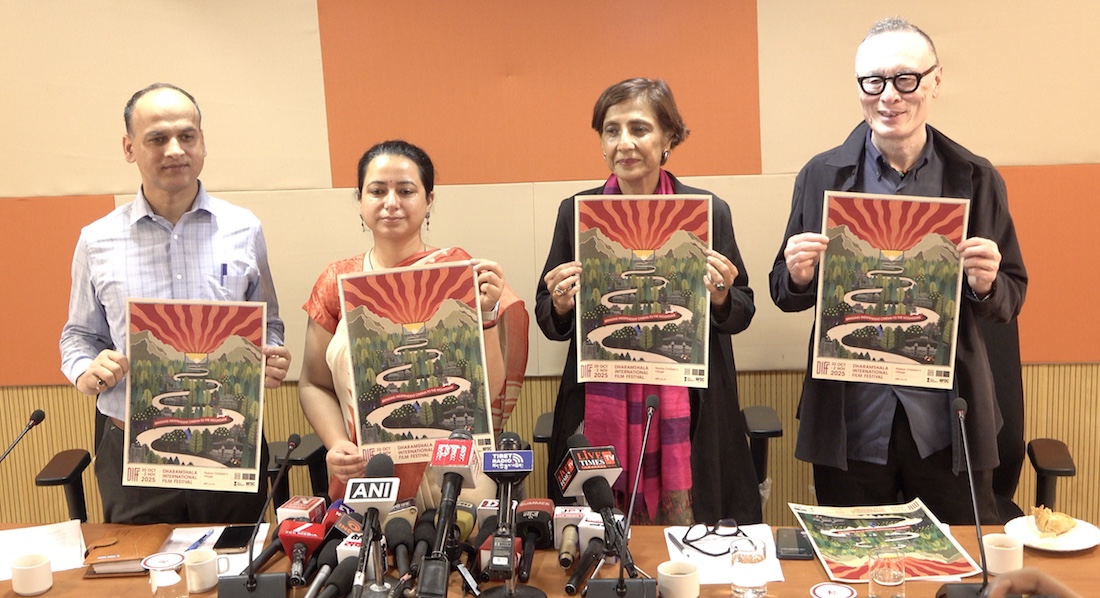By Tenzin Tsering
“I am Tibetan.
But I am not from Tibet.
Never been there.
Yet I dream
Of dying there”
You once again speak the truth!.
 A popular Tibetan poet from Tibet, Gade Tsering began his poem titled “My Tibetanness” in response to exile poet Tenzin Tsundue’s poem using the same title. This could be the tone of what the exile Tibetans are now coming together, adding voices to the Tibetans inside Tibet in the form a “Renaissance Series” undertaken by Students For Free Tibet, India.
A popular Tibetan poet from Tibet, Gade Tsering began his poem titled “My Tibetanness” in response to exile poet Tenzin Tsundue’s poem using the same title. This could be the tone of what the exile Tibetans are now coming together, adding voices to the Tibetans inside Tibet in the form a “Renaissance Series” undertaken by Students For Free Tibet, India.
The activist group launched its ‘Renaissance Series’ at TCV day school here Friday. The renaissance series is in response to all things “banned in Tibet” and will be amplified in exile.
The theme is on the creative voices of the Tibetans who are asserting their Tibetan identity in the form of blogging, film making, painting, songs, poetry and books which are banned in Tibet.
A two hour long event of 12 acts included exiled Tibetan poets, singers and activists performing compositions of the Tibetans inside Tibet, talking about works of Tibetans who have faced arrests and imprisonment for expression of their creativity.
This is the first of the series and SFT India says it will continue to hold more such programs in the future.
Tamding, a young Tibetan artist who arrived into exile from Tibet a few years ago, opened the show by singing Tashi Dhondup’s “1958 to 2008” song. Tashi Dhondup was sentenced to a year and half in prison for singing what the Chinese call “subversive songs”.
The Title song of his album “Torture without trace” was performed rendering the powerful lyrics which says, “first, a sad tune for my brother hasn’t returned from afar./ Second, the pain because there is no harmony for people./ Third, the occupation and denial of freedom for Tibetans./This is all torture without trace.”
Sonam Lhundup , a painter in exile gave an account of Tibetan painters, students and artists in Tibet who highlight their Tibetan identity and culture through their paintings.
“Many of them have studied in China as students, yet their works clearly deviate from their Chinese teachers’ paintings which portray Tibetans as being happy under the Chinese rule. Tibetan painters are resolute and committed towards the responsibilities they have in accentuating the problems faced by our fellow country folk in their works” said Lhundup as paintings by of Tibetan painters were shown.
Phuntsok Wangchuk from Gu Chu Sum ( organisation for Tibetan political prisoners) spoke about Shogdhung and Shokjang and their banned books.
Shogdhung (morning conch) used as a pen name by Tragyal, was arrested in April 2010 on charges of “splittism” for his book “The Line Between Sky and Earth”. His book is a poetic indictment of Chinese rule over Tibet and calls for a civil disobedience movement from the Tibetans. It was published secretly in March and is now banned.
Dabe, a popular stand-up comedian and poet from Amdo who now lives in exile performed at the event, giving the audience some light moments.
A young Tibetan boy named Dhargay rendered soulful ‘yi rey kyo’ song by Kunga, a popular singer from Tibet.
Tenzin Tsundue, exile poet and independence activist spoke about how poetry is one of the most dynamic forms of expression for Tibetans inside Tibet, who are in constant search for their Tibetan identity under the Chinese rule.
“There are Tibetans who write in Tibetan language about the inner resistance to sinicization and kindling the pride in Tibetan identity writing about the famous Kings of Tibet. And there are also many Tibetans who write in mandarin (Chinese language) like Woeser, telling us painful stories of Tibet and the struggle each Tibetan inside Tibet is facing,” said Tsundue.
The event which saw painful melodies of Tibetan artistes whose voices are now hushed, saw tears, smile and laughter from the audience.
The renaissance episode was concluded with a screening of a song by a Tibetan female singer Lhakyi titled ‘please give a phone call’ conveying the emotions of Tibetans from Tibet who are waiting for a phone call to hear that the Dalai Lama is returning home.









